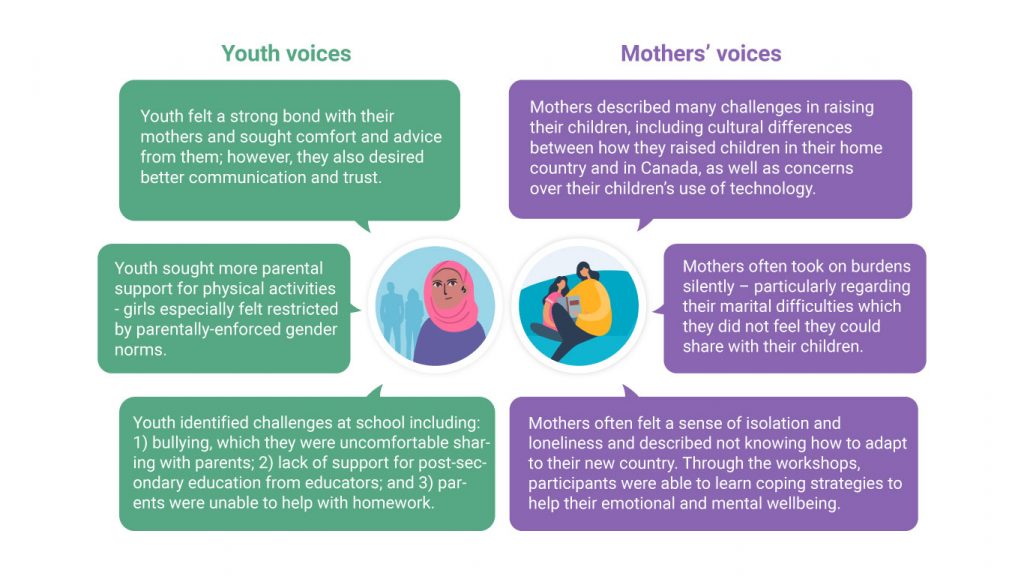Safe Spaces: Youth with Refugee Experience and Their
Parents Harnessing Resilience
Researchers: Susan Brigham1, Bayan Khatib2, Marwa Khobeih2, and Omar Reda3
Affiliations: Mount Saint Vincent University1, The Syrian Canadian Foundation (SCF)2, and Untangled3
Research Partner: Syrian Canadian Foundation
Keywords: refugee youth, refugee parents, families, family-based supports, Syrian refugees, Arabic-speaking families, mothers, trauma, resilience, mental health, qualitative research, workshops
Jump to: Full Infographic, Methodology, Findings, Video
Summary
Overview: In this study, ten workshops were organized for Arabic-speaking refugee youth and their parents. Facilitated by the Syrian Canadian Foundation and psychiatrist Dr. Omar Reda, the workshops aimed to provide a safe space for refugee families to build better inter-family understanding and integrate trauma stories to build resilience. The workshops were open to both parents; however only mothers chose to attend. The workshops were preceded and followed by focus groups with the participants.
Objective: To explore tensions that may arise between refugee youth and their parents regarding social integration; examine family dynamics in a new culture; help participants develop coping skills; and build resilience among refugee youth and their parents.
Research Justification: Refugee families face considerable stressors when they arrive in Canada, including racism, alienation, poverty, language barriers, acculturation, difficulty accessing employment and housing, culture shock, and other urgent survival and social integration concerns. This study sought to examine concepts and issues related to culture, inter-family communication, rights, and youth empowerment while bolstering family cohesion and improving the coping skills and resilience of participants and their families.
Infographic Excerpt

Methodology
This study used a qualitative research approach. Focus group interviews were held with the participants – 10 refugee youth aged 12 to 20 years old and their mothers living in the Greater Toronto Area. Before the workshops began, focus groups were held to identify participants’ needs related to social integration and inter-family relationships. At the end of the series of workshops, another round of focus groups was held to understand the impact of the workshops.
Findings
Youth voices:
- Youth participants felt a strong bond with their mothers and sought comfort and advice from their mothers.
- However, they also desired better communication with their parents and for their parents to trust them more.
- Youth sought more parental support for physical activities – girls especially felt restricted by parentally-enforced gender norms. They also identified a lack of physical activity programs available to them.
- Participants also identified several challenges at school, including bullying – which they did not feel comfortable sharing with parents or teachers – and lack of support for post-secondary from school staff. Another challenge was that their parents were unable to help with homework due to language barriers or unfamiliarity with the subjects.
Mothers’ voices:
- Mothers in the study experienced challenges related to language barriers. They found it difficult to find time to study English while taking care of children and the household.
- Mothers encountered challenges in raising children, including cultural differences between how they raised children in their home country and in Canada, as well as concerns over their children’s technology use.
- Mothers often took on burdens silently – particularly regarding their marital difficulties which they did not feel they could share with the children.
- Since fathers did not attend these sessions, resolving tensions within the family was limited mainly to child-parent relationships and did not include marital relationships, which were key issues for the mothers in the study.
- Mothers often felt a sense of isolation and loneliness and described not knowing how to adapt to their new country. Through the workshops, participants learned coping strategies to support their emotional and mental wellbeing.
Recommendations:
- There is need to engage fathers in programs, services, and supports. Without their participation, whole-family approaches to addressing inter-family tension and social integration are less effective.
- More efforts are needed to engage youth in meaningful youth-centered activities. In particular, more physical activity programs are needed, especially for girls.
- Flexible and accessible English as an Additional Language classes for women are needed to give women opportunities to socialize with other women of different backgrounds and engage in facilitated discussions about parenting, spousal relationships, and other issues.
- Supports for youth are needed at multiple sites, including in the family, school, and the broader community. Teachers, school counsellors, faith-based groups, provincial and municipal government supports, and other community organizations all have a role to play.
Video
Safe Spaces: Building Inter-family Understanding and Harnessing Resilience for Arabic Speaking Refugee Families in the Greater Toronto Area
This video provides an overview of this project. It shares quotes from the focus groups participants as they reflect on the challenges of social integration and what they learned from the workshops. The video is captioned in Arabic.
Explore more projects


